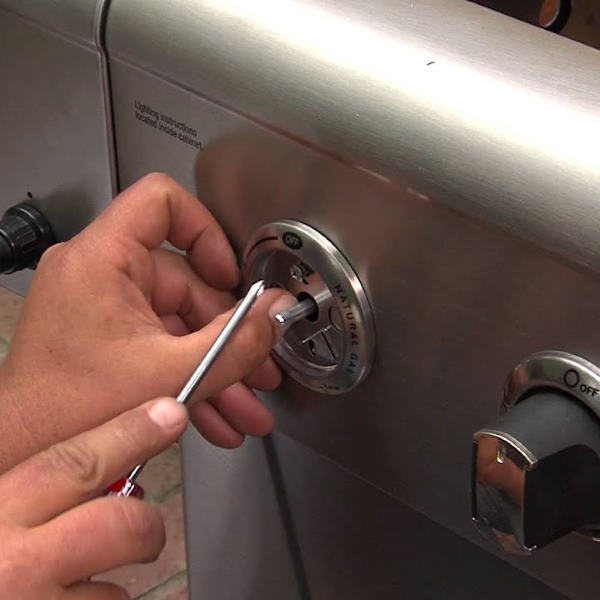
Gas grilling is becoming more popular by the year (especially in the US). This is because gas grills don’t require any preparations before cooking, unlike charcoal grills.
You just fire up the grill and off you go cooking
But what makes gas grills, even more, stand out is the ability to regulate temperature. Convenience at its best.
These grills come in 2 types, depending on the type of gas they use:
- Propane
- Natural gas
Propane grills are popular because the propane tanks are portable – great if you travel a lot or grill in different places (even the backyard).
Natural gas grills, on the other hand, have their own gas line which means an endless supply of fuel but limited mobility.
If you have a propane grill and are wondering if you can use natural gas instead of a propane tank, the answer is: yes but not by default.
You can, however, convert it using some basic tools and a bit of elbow grease.
There are, also, conversion kits especially made for this occasion but you can’t use them on all grills.
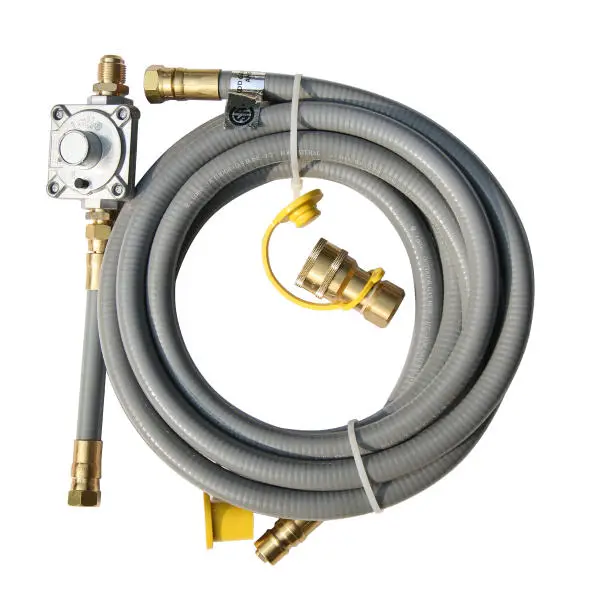
How do you do it and why you just can’t connect the grill to your gas line, keep reading and you’ll soon find the answer.
How Do I Know If I Have Natural Gas Grill or Propane One?
All grills have a rating plate attached to them that indicates the type of fuel the grill uses.
Rating plates with the letters “NAT” or “NG” are Natural Gas fueled. Plates with the letters “LP” stand for Liquid Propane fueled grills.
The 2 fuels are not interchangeable.
Are Natural Gas and Propane Grills the Same?
No. They look the same but operate in a different way.
Propane is much more combustible than Natural Gas.
As its name implies, Natural Gas occurs in nature as the result of decayed plant and animal compounds.
Propane is a by-product of the fuel refinement process by cleaning contaminants out of impure natural gas. As a man-made accelerant, propane is more efficient at burning and produces more heat.
I wasn’t sure which one worked better so I thought I would do some homework.
How Natural Gas and Propane Stack Up
One cubic foot of Natural Gas equals 1030 BTUs (British Thermal Units) and Propane equals 2516 BTUs.
This means Propane burns hotter than Natural Gas.
Bar-b-que chefs and grillers know how quickly a propane gas grill heats up as well as how it maintains temperature easily.
It takes more Natural Gas to heat the same amount of food as it does propane, however, there are some distinct differences that should be considered.
Can Propane Grills use Natural Gas?
Not by default. Each type of grill uses different nozzles and pressure regulators to distribute its gas.
Propane starts as a liquid and becomes a gas as soon as it is introduced into the atmosphere.
Natural gas remains a gas from the source to the burner.
Portable grills tend to use Liquid Propane and built-in home or commercial grills tend to use natural gas from municipal gas networks. The same is true for RV grills.
Cost of Natural Gas versus Propane
Natural Gas costs less to produce 1,000,000 BTUs of heat than Liquid Propane.
Natural Gas is sold by the cubic foot and Propane is sold by the gallon.
It is possible to calculate the costs by converting the gallon of Propane to cubic feet of Propane gas. Then determine how much of each fuel is consumed to achieve the same temperature.
The math goes something like this:
- 1,000,000 BTUs from Natural Gas = 1,000 cubic feet = $6.00
- 1,000,000 BTUs from Liquid Propane – 11.2 gallons = $23.00
Which Way to Go
I’ve found circumstances dictate options for gas grilling.
If portability is important, Propane makes the most sense.
If a home or office already has a natural gas line for heaters and/or other appliances, it becomes the fuel of choice.
Many rural homeowners appreciate the value of Propane because it doesn’t require a municipal resource for supply. Propane can even be delivered to remote locations.
Limitations of Using Propane
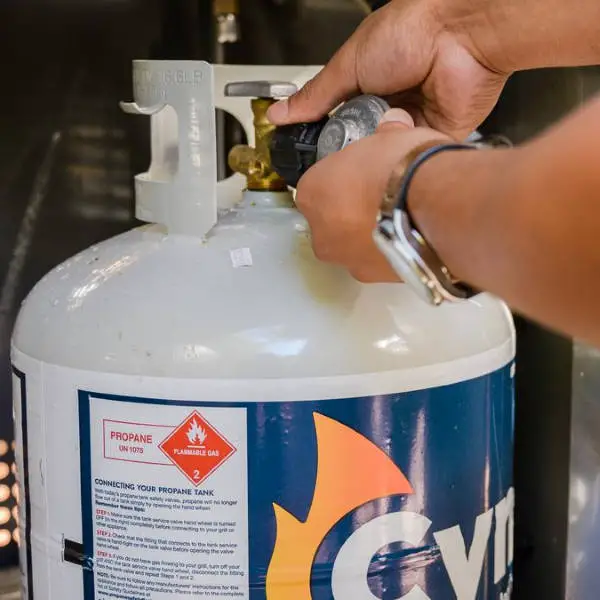
Those who have been wondering if they can use a propane grill with natural gas have probably been exposed to the limitations of a propane grill.
Of course, these grills are portable but you are limited on the amount of cooking that you can accomplish.
Propane grills usually have a standard 20 lb tank for fuel and this means your cooking is limited to the amount of fuel left in the tank.
A full tank will allow you just about 8 hours of cooking time and woe unto you if your tank is not full.
You will run out of gas in the middle of a cookout and this can be quite frustrating.
You will have to run to a propane dealer for a refill and this will take a lot of time.
Your uncooked meals will remain exposed and they could even go bad by the time you get back with the refilled tank.
But you will not have to go through all these troubles when you are cooking with natural gas.
The Advantages of Natural Gas for Grilling
Cooking with natural gas is quite advantageous as you will never run out of fuel.
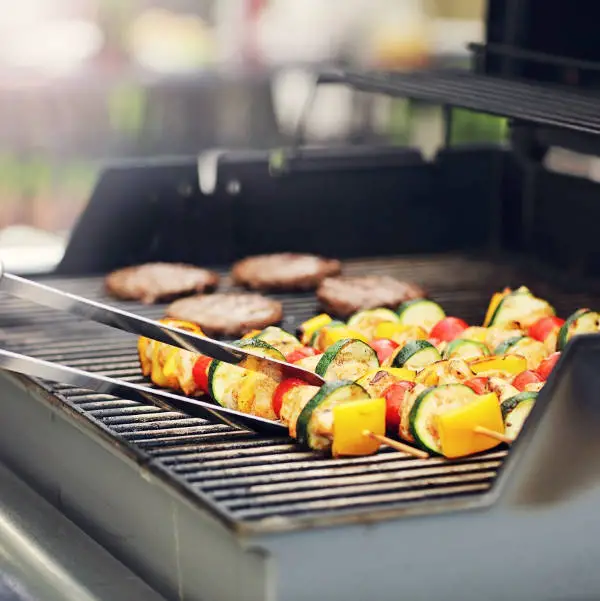
The gas is usually supplied by a gas utility company or the local government.
You can cook as much as you want. Great isn’t it?
The only drawback of using natural gas is its immobile nature.
Since natural gas systems are fixed, you won’t be able to move the grill around much. Of course, you can use a flexible pipe for some mobility but its reach is still limited.
Using your propane grill with natural gas also requires some effort but once you get this done, you will be able to cook more with minimal disturbance.
Let’s now take a look at how to convert a propane grill to natural gas.
Can You Convert a Propane Grill to Natural Gas?
Yes, you can. You’ll need the right parts and tools for this.
Converting a Propane Grill to Natural Gas
The tools that you need for this process are the standard tools that are found in most of our homes and hardware stores.
You will need:
- Screwdrivers
- Wrenches
- Needle-nose pliers
- Drill bits
It is still possible to get the job done with a standard set of drills but it’s advised to get a numbered set.
You will also need a pipe joint compound for the threaded connectors and a camera for taking the pictures of the parts that you are taking down so as to help you put them back in the right manner.
You will have to put the valves and orifices just as you found them for the grill to work properly and this is best possible by taking pictures of the set before dismantling it.
The entire process of doing this conversion should not take you more than an hour and your grill will be ready for some steaks.
With all the tools in place, you will then have to find a suitable section on your home’s natural gas system to “T” off so as to get a line that you will connect to your grill.
A standard iron pipe will do and so will a flexible gas pipe.
The pipe should be of an adequate diameter so as to ensure that gas flows freely.
Natural gas delivers a lot of gas at any given time and you will need a pipe that can handle all that volume.
The recommended diameter for the pipe used for this conversion is half an inch.
You should also make sure that there are no leaks in the entire system so as to guarantee your safety when you are using the grill and you can do this by applying soapy water on your connections and the entire system.
Natural gas can blow up your entire house and this is one of the reasons why you need to check for gas leaks on the connections.
Inhaling the gas is also not good for your health and this is another reason to be careful when making the connections.
You Cannot Use Natural Gas on a Propane Grill by Default
There are a lot of benefits to using natural gas for cooking.
Read this comprehensive article if you have been wondering “Can you use a propane grill will natural gas?” to find out how you can convert your propane grill to use natural gas and as well and the benefits and drawbacks of this conversion.
In the end, both fuels are eco-friendly and burn cleanly without putting contaminants into the atmosphere. Some folks prefer Natural Gas due to its more natural source rather than chemically processed liquid propane.
Some feel propane provides a more authentic “grilled” flavor than natural gas, but most people can’t tell the difference at all. I believe grillers can go with either fuel and get excellent results.

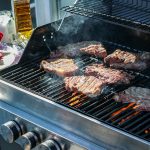
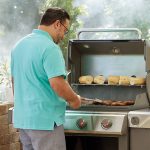
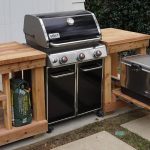

Thank you very much for the clear instructions. I had everything done and my flame was too low. After watching your video I discovered I needed to drill out the gas jet to allow enough gas into my burners.
Thanks
Can a natural gas grill be converted to a propane grill?
Some yes, while others no. If it’s possible, you need to replace the orifices and regulator. Here’s an example.